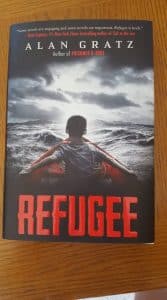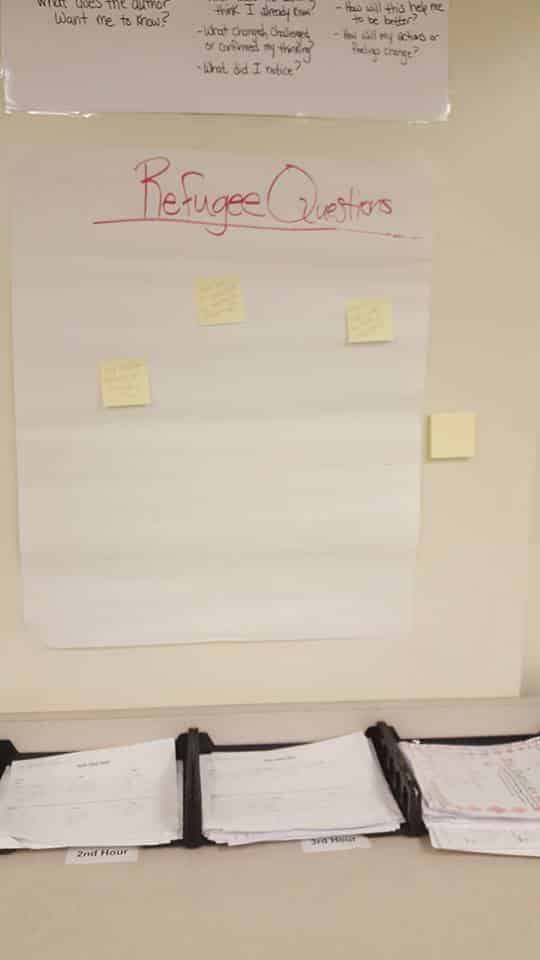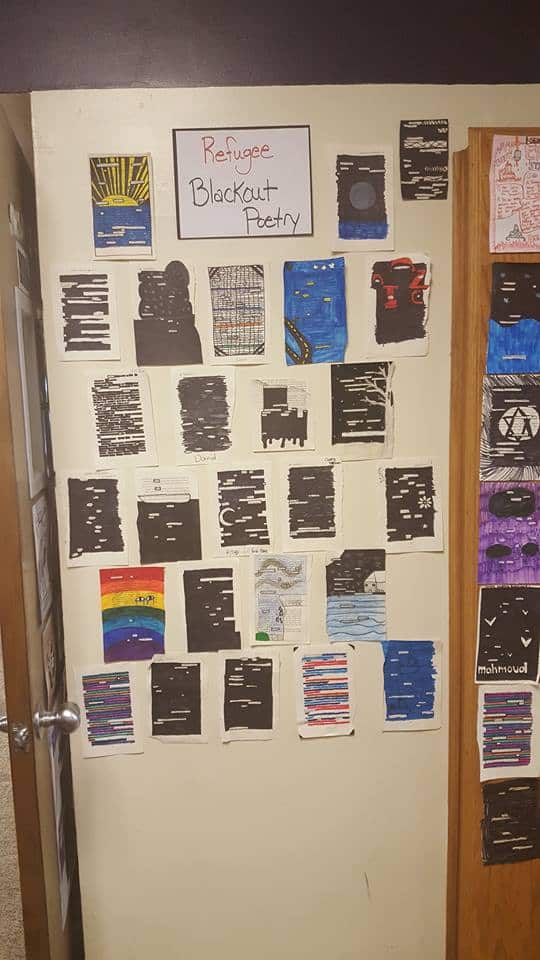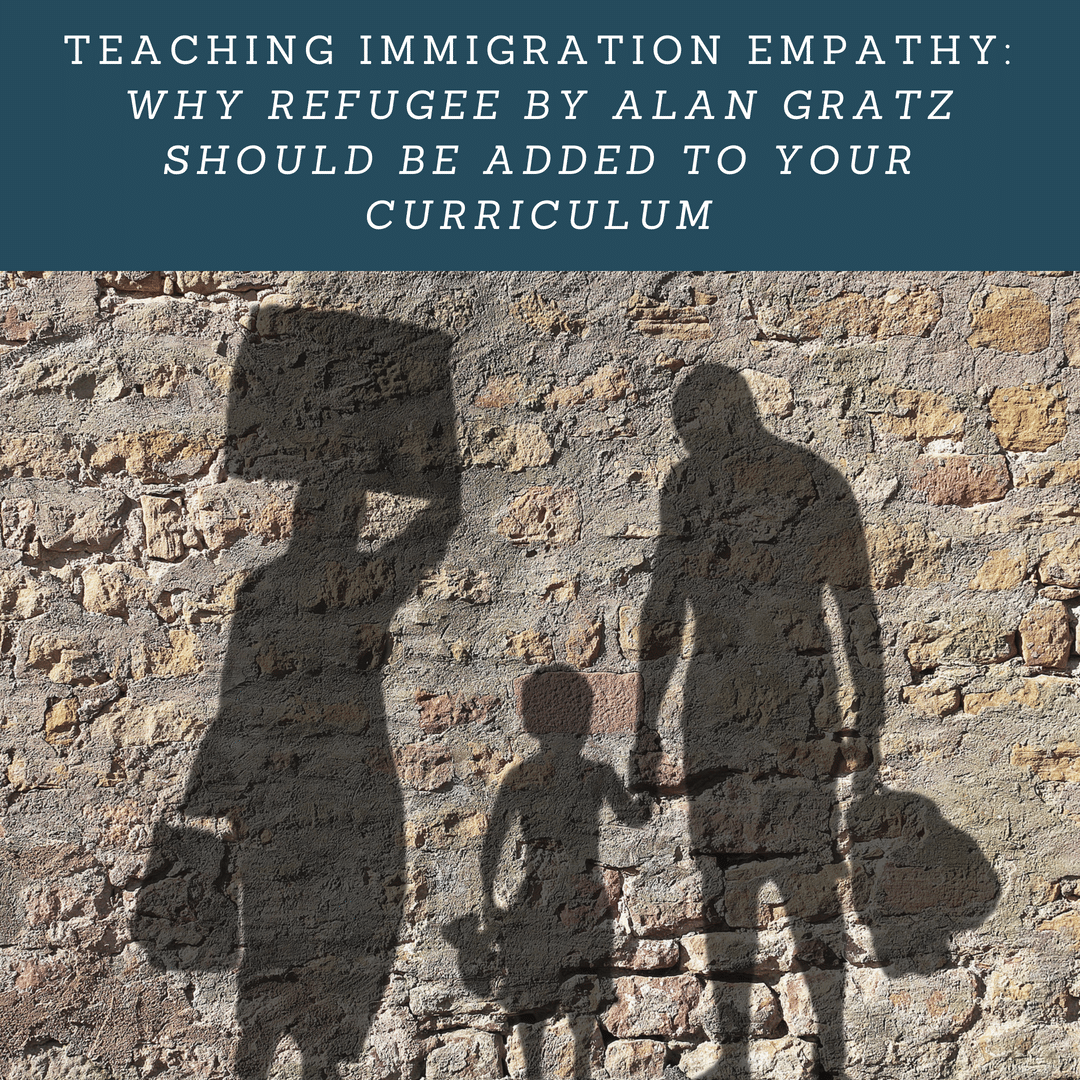It’s summer vacation which means that most of the Secondary ELA groups I am in on social media are full of teachers asking for recommendations for books to add to their curricula. I am a big believer in the power of books to change hearts and minds, so my suggestions lean toward YA literature that is high interest, but also deals with timely issues.
We have been fortunate in my district, to be able to provide visiting authors for our 8th and 11th-grade students for the past number of years. This past year the 11th graders read How Dare the Sun Rise: Memoirs of a War Child by Sandra Uwiringiyimana with a visit from the author. The 8th graders (my students) read Refugee by Alan Gratz and welcomed the author to our school. Refugee is definitely my suggestion for anyone looking to add a fresh novel to their ELA curriculum.

Refugee is both historical and contemporary realistic fiction. Gratz alternates between three stories of refugee children: Josef, a 1933 Jewish refugee fleeing Germany with his family to Cuba; Isabel, a 1994 Cuban refugee fleeing with her family to Miami; and Mahmoud, a present-day Syrian refugee fleeing with this family to Germany. Even though their stories seem disconnected (the reader finds out they are, in fact, all intertwined by the end), parallels in the world’s current and past refugee crises is evident. The chapters are short, and tend to end on cliff-hangers, leaving students wanting “just one more.” Based on student interest alone, this is a home-run of a novel.
Reading great novels is actually our way to teach our students reading strategies, writing strategies, vocabulary, and grammar. Refugee is a rich text for doing all four of these basic ELA standards.
Because of the unique structure of the novel–rotating between three main characters–keeping the stories straight lends itself to creating timelines for each journey. My students would fill out a Book, Head, Heart framework (from Beers and Probst’s 2017 book, Disrupting Thinking: Why How We Read Matters) for a character of choice. The “Book” column is a basic summary. Using what they wrote in this column, students would research visual representations of what was happening in the story. For example, students found old photos online of the S.S. St. Louis that Josef’s character and his family sailed aboard for Cuba from Germany; they found photos of the Cuban refugee crisis of 1994 that Isabel and her family were thrown into; and they printed maps of the devastation happening in Aleppo, Syria now that Mahmoud’s family would witness. We kept a classroom visual timeline of each character’s journey, and students could use it to retell portions of what happened to people who were absent, or when we were practicing summarizing sections.

The “Head” column of the Book, Head, Heart framework provided students a space to make predictions, talk about their feelings, and jot questions. As a class, we kept a Refugee “parking lot” for questions we had that we wanted to come back to somehow via more research or maybe later in the book. Because of this, many students took it upon themselves to look up new vocabulary, search for more information on historical events, and look up current policies on refugees and immigration. This sparked excellent small group and whole class discussions and allowed me to bring in a variety of informational and argumentative texts on issues of refugees and causes/effects of immigration.

My students stretched their creative writing muscles by examining what they wrote for the “Heart” column of the framework. This column asks students to think about how they are changed, what they will do differently, or how they will think differently because of the story. We used these notes as a starting point for writing some poetry.
First, we did some Blackout Poetry. I found some old books in our Media Center’s “free or recycle” bin and ripped the pages out. Each student used their page to find words that they felt represented the character they chose. Then they literally blacked out the rest of the words on the page to form a poem. See below.
 Our final project for the book, besides having Alan Gratz visit our school and give a presentation to the entire 8th-grade class, was to write a Persona Poem for a character in the book. I did not restrict them to just the main character but opened it up to any character of their choosing. We workshopped the poems first by filling out a questionnaire as if we were the character we chose. It asked students to make many inferences about how their chosen character would answer. Then we learned about poetic devices. Students were required to use at least two. I wrote alongside my students creating a Persona Poem for a character from a different whole class novel (The Giver) to avoid them duplicating my ideas and words.
Our final project for the book, besides having Alan Gratz visit our school and give a presentation to the entire 8th-grade class, was to write a Persona Poem for a character in the book. I did not restrict them to just the main character but opened it up to any character of their choosing. We workshopped the poems first by filling out a questionnaire as if we were the character we chose. It asked students to make many inferences about how their chosen character would answer. Then we learned about poetic devices. Students were required to use at least two. I wrote alongside my students creating a Persona Poem for a character from a different whole class novel (The Giver) to avoid them duplicating my ideas and words.
Here is the example I wrote from the point of view of Jonas from The Giver:
“Jonas Dreams In Color”
The memories I receive
relieve me from the small world of the Community
while also trapping me in my own
mind.My family unit does not know
that I have ferocious feelings;
we continue to lie to each other.I am surrounded by a world
living in black and white,
while I see and dream and live
in technicolor vividness.I am inspired by
the possibilities of a life
with love
even if that love
means risks and failure and disaster.Someday
we will all live
in color again.Someday soon the sun
will surround the citizens.Someday we will have a love
that fills us with a joy
only found
in
the memories
I receive.
For student examples from Refugee, please click here.
Whole class novels should be chosen carefully not just for content that is high interest and can offer valuable lessons to students, but also for its ability to mentor students to demonstrate knowledge and understanding of the standards. It is my experience that the novel Refugee by Alan Gratz does both of these.







Outcasts United is also another good one
Excellent post, Katie! I love the book and am excited to share it next year. Thanks!
Excellent! I just happened to buy this book today. Thank you.
Outcasts United was the summer read for a high school class I taught. After processing the text and studying some issues related to refugees, we invited a few local refugees to speak to our class. By far the most powerful moment in my teaching career.
Would you be willing to share the questionnaire you had your students fill out in preparation for the persona poems?
Awesome activities and tips! Our school does a Student/Parent Book Club and my group read Refugee. We will do a brief discussion and might try the blackout poems as Student/Parent teams 🙂
I would love a copy of the questions students answered when preparing to write their Persona poems. Would you be willing to share? Thank you!
Lots of great ideas- thank you! I too would love the questions you asked in preparation for the Persona poems, if you’re willing to share.